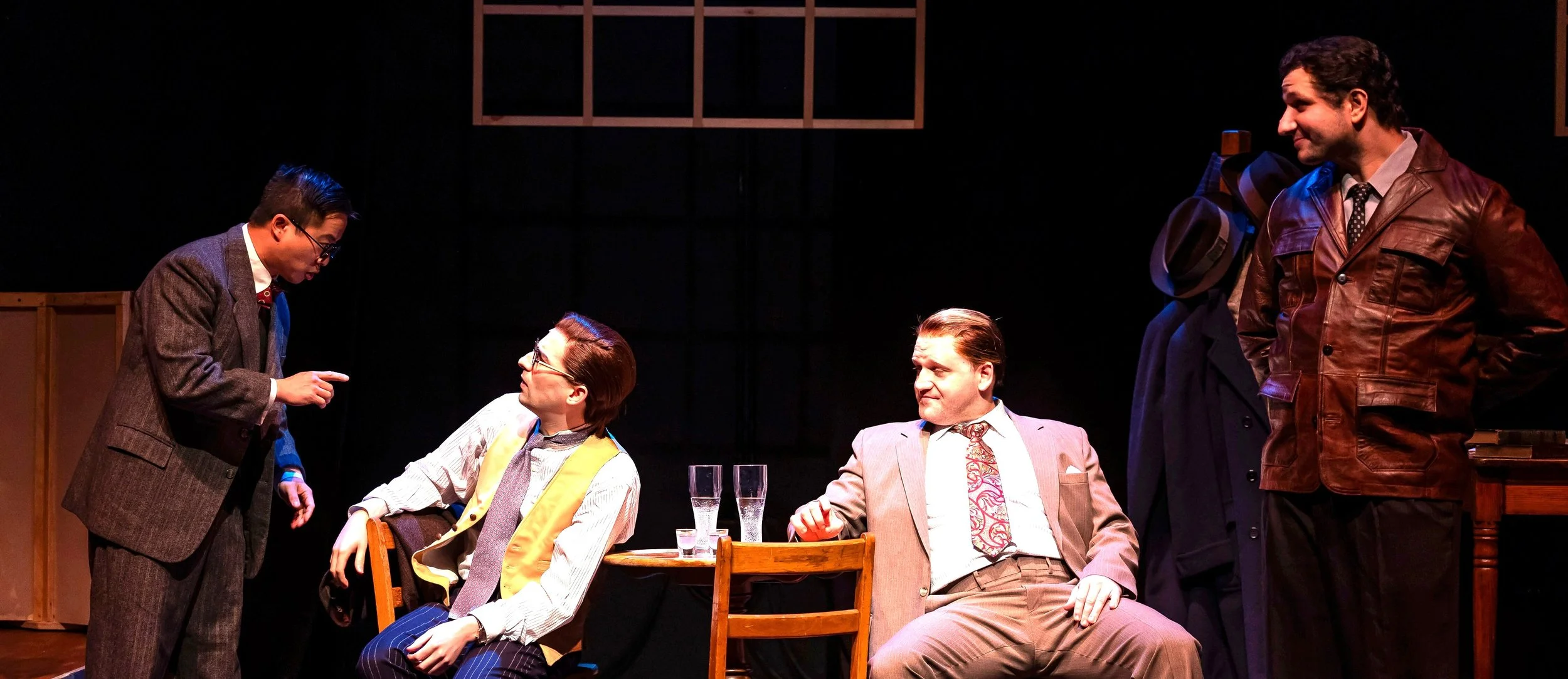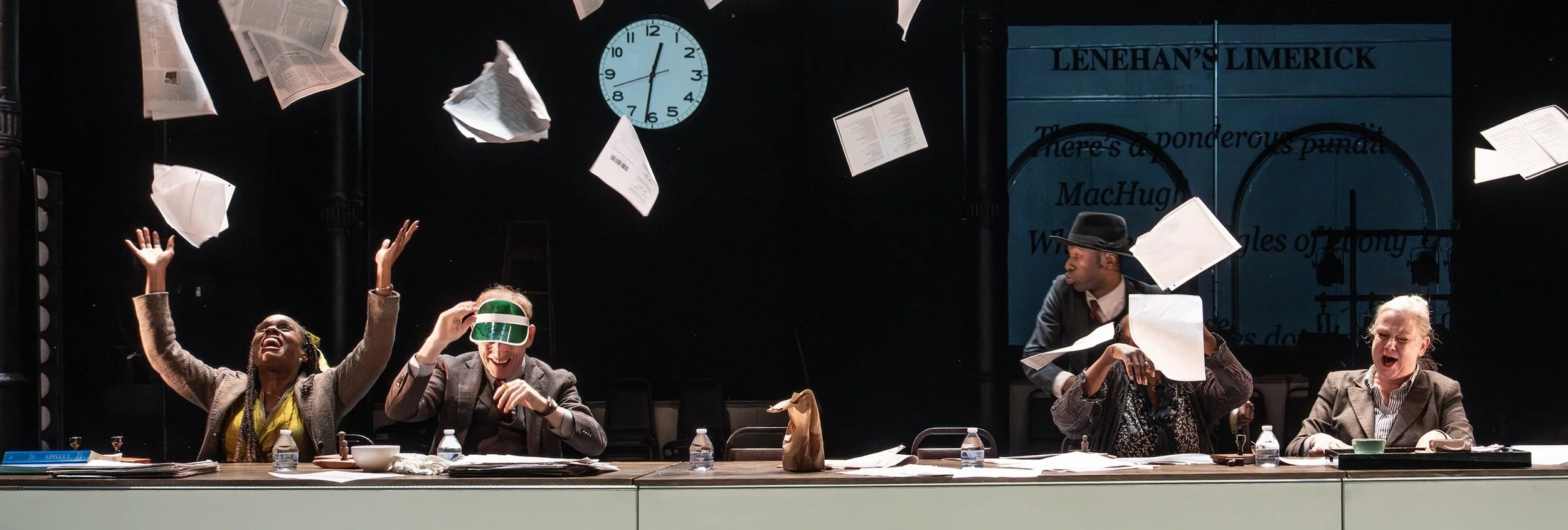Michael Walek’s The Bookstore is a cozy, unprepossessing play about the power of literature to change one’s life and the importance of both writing and reading. It is also about the people who do one or the other, and those who try to do both, and it’s peppered with nuggets about writers, readers, and the spectrum of human experience.
The Baker’s Wife
The musical The Baker’s Wife has had a notoriously checkered history. With a book by Joseph Stein and music and lyrics by the young Stephen Schwartz, it first appeared in 1976. But, amid casting changes (Patti LuPone survived) and infighting, producer David Merrick closed it before it got to Broadway. Over the years it has had many iterations, in hopes of correcting whatever sank it then (critics excoriated the book but praised the music). LuPone’s song “Meadowlark” has become a standard for cabaret singers. The current revival at the Classic Stage Company (CSC), boasting a stellar cast, is likely to be its best shot at resuscitation.
Archduke
If the title of Rajiv Joseph’s latest play, Archduke, conjures up Franz Ferdinand, the most famous archduke of all, that’s exactly what’s intended. But Joseph is less concerned with the death of the Serbian monarch whose assassination in 1914 sparked World War I than he is with the social and historical forces that helped radicalize the three principal killers: Gavrilo Princip, Nedeljko Čabrinović, and Trifko Grabez.
The Wild Duck
Henrik Ibsen’s play The Wild Duck received a confused reaction from most critics after it was published in 1884. Almost alone, George Bernard Shaw acclaimed it, and while its reputation has gradually grown, it isn’t performed nearly so much as A Doll’s House or Hedda Gabler or Ghosts: the last New York City production in English was in 1987. For a play that the stern critic John Simon called “one of the finest tragicomedies in all dramatic literature,” the neglect is shocking, so Theatre for a New Audience deserves kudos for resurrecting it. The result, however, is often disappointing.
Duke & Roya
It’s impossible to ignore chemistry, whether it’s as basic and essential as two molecules of hydrogen and one of oxygen, or as toxic and unwelcome as a string of PFAs. In Charles Randolph-Wright’s Duke & Roya, the chemistry goes beyond the molecular level, as Jay Ellis and Stephanie Nur demonstrate in the title roles. It’s a powerful component for this play, which by turns is romantic and political and covers a lot of ground without quite bursting at the seams.
Prince Faggot
Jordan Tannahill’s drama Prince Faggot, a love story about a gay heir to the British throne and his boyfriend, is admirably multifaceted: part fantasia, part social and political commentary, part agitprop. At heart, though, Prince Faggot is a bittersweet romance about a royal and a commoner, a sort of Roman Holiday for the 21st century—if Audrey Hepburn’s princess had become a devotee of drug-assisted intercourse and Japanese rope bondage.
A Special Relationship
In political parlance, the term A Special Relationship refers to the longstanding alliance of America and its “closest ally” Britain (the phrase “America’s oldest ally” refers to France). Disparities in language are a prominent feature in Tim Marriott and Jeff Stolzer’s winsome comedy, which is playing as part of the Brits Off Broadway festival. The piece takes as a major theme George Bernard Shaw’s maxim (sometimes attributed to Winston Churchill or Oscar Wilde): “England and America are two countries divided by a common language.”
Angry Alan
John Krasinski first made a splash on the TV series The Office (2005–13), and after that with the creepy horror film A Quiet Place (2018) and its goosebump-laden sequels. He has a long film resume as actor, writer and director, and lately he has boosted his credits as an action star in the Amazon Prime series Jack Ryan. Yet, although Krasinski appeared in the play Dry Powder with Hank Azaria and Claire Danes in 2017, film acting doesn’t necessarily point toward stage prowess. But the confidence with which Krasinski takes the stage in the first moments of Angry Alan gives one hope that he’s an exception, and it only increases as the actor’s masterly performance opens Studio Seaview (formerly 2nd Stage) with a bang.
Goddess
The new musical Goddess signals from the get-go that it has Broadway ambitions. Vivid with saturated colors, eye-catching in Arnulfo Maldonado’s underground nightclub, and bursting with energetic dancing and singing, the Public Theater production is a grand assemblage of first-rate talent. And, as in the long-running Hadestown, another show with a subterranean setting, the characters are a mixture of supernatural entities and humans.
Shellshocked
Two-character plays are a tricky thing to pull off. When they are successful, they can be engaging entertainments. Sleuth boasted a great deal of mind games, along with costume changes. In the past season, The Roommate and Dakar 2000 traveled through scene and time changes, but with expectations often upended. Although Philip Stokes’s Shellshocked also relies on mind games, it feels hermetically sealed.
Outraged Hearts
In a letter to Jay Laughlin, founder of the publishing house New Directions, in late 1945, Tennessee Williams wrote about his process: “All of my good things, the few of them, have emerged through this sort of tortured going over and over—Battle [of Angels], [The Glass] Menagerie, the few good stories. ... But always when I look back on the incredible messiness of original trials I am amazed that it comes out as clean as it does.” The bill of two one-acts under the umbrella title Outraged Hearts—early versions of The Glass Menagerie and A Streetcar Named Desire, revived by the Fire Weeds theater company—confirms the messiness Williams alludes to. As ambitious as Fire Weeds’ project is, it yields little beyond the confirmation of Williams’s own words.
Gertrude Lawrence: A Lovely Way to Spend an Evening
If the British actress Gertrude Lawrence is remembered at all nowadays, it is primarily for originating the part of Anna Leonowens in Rodgers and Hammerstein’s The King and I (1951). She didn’t get the role in the 1956 film, and her reputation rests on a long theatrical career in Britain and America, as Lucy Stevens’s gossipy Gertrude Lawrence: A Lovely Way to Spend an Evening, makes clear.
The Last Laugh
Three of Britain’s leading comedians of the 20th century are the focus of Paul Hendy’s The Last Laugh, a play that harks back to Sutton Vane’s Outward Bound (1923) and Trevor Griffiths’ Comedians (1975). As the trio meets in a shabby dressing area of an uncertain venue for some kind of benefit performance, issues of what makes something funny and who steals jokes from whom, along with plenty of comic insults, arise.
Grief Camp
Eliya Smith has chosen the title of her play Grief Camp cannily. The name nails down the setting and the situation, and it allows her to start the proceedings at a low key, with two of her six young people, Brad and Luna, talking in the dark after lights out. It scarcely matters that the audience can’t yet identify who is who, because the chitchat is innocuous: “Are you awake?” “I’m debating if I want to pee.” “I’m sorry about the stuff at the lake.”
A Streetcar Named Desire
Tennessee Williams’s A Streetcar Named Desire has one of drama’s greatest female roles—Blanche DuBois, perhaps only rivaled by Shaw’s St. Joan and Ibsen’s Hedda Gabler. It’s a theatrical mountain that any serious actress would like to scale, and Patsy Ferran deserves credit for doing so, even if the Almeida Theatre production visiting BAM from London comes up short. Directed by Rebecca Frecknall, this Streetcar also features the better-known Paul Mescal (of Gladiator II renown) as Stanley Kowalski.
Grangeville
Grangeville, the title of Samuel D. Hunter’s new piece is, as in most of his plays—Pocatello, Lewiston/Clarkston, Greater Clements (but not The Whale)—the Idaho setting of his latest drama, a two-hander about estranged half-brothers coming together to rehash a lot of anguished family history. If the result is disappointing, it’s because Hunter is working over well-tilled ground.
Curse of the Starving Class
In the late 1970s, when playwright Sam Shepard decided to move on from his short experimental works staged at La Mama in the East Village, the Royal Court in London, and the Magic Theatre in San Francisco, he turned to the American theater’s standby—a dysfunctional family. The result was the three-act Curse of the Starving Class. The disintegrating family would be the focus of True West and Buried Child, perhaps his two most famous works, but the seeds are already sprouting wildly in Curse.
Henry IV
The actor Dakin Matthews won a special Drama Desk award in 2003 when he adapted both parts of Shakespeare’s King Henry IV into a single, albeit lengthy, version produced at Lincoln Center. His edit allowed regional theaters to present the histories of Henry IV; his son Prince Hal; and the roguish Falstaff in one production, lessening the expense of mounting two separate ones. The adaptation removes lesser characters, such as Mouldy and Rumour in part 2, and trims extended metaphors and a lot of obscure Elizabethan humor. But the famous scenes and lines remain—“I am not only witty in myself, but the cause of wit in other men,” “Uneasy lies the head that wears a crown,” “We have heard the chimes at midnight.”
After Endgame
Kevin James Doyle has a good story to tell in his solo show After Endgame—along with several engaging digressions. But none of it has to do with performing in the play Endgame by Samuel Beckett. The endgame of the title is the last third of a chess match, Doyle explains. “Blunders typically happen in the endgame,” he warns, when only a few pieces remain on the board.
Beckett Briefs
Beckett Briefs, the rubric for three short plays by Samuel Beckett at the Irish Repertory Theatre, provides a rare look at works by the dramatist whose Waiting for Godot has overshadowed all theater since the mid-20th-century. The progression of plays devised by director Ciarán Hinds moves from the slightest, Not I, featuring only a mouth speaking, to Play, in which only three heads appear, to the longest, and most fruitfully theatrical, Krapp’s Last Tape, featuring Oscar winner F. Murray Abraham, head to toe. All three works are suffused with regrets about or outrage at the setbacks, blunders, jealousy, and dishonesty in the characters’ lives.


























